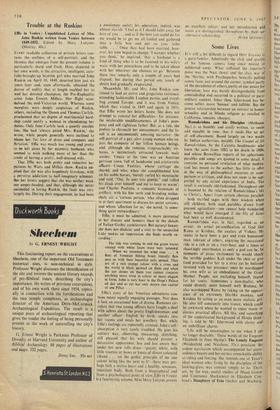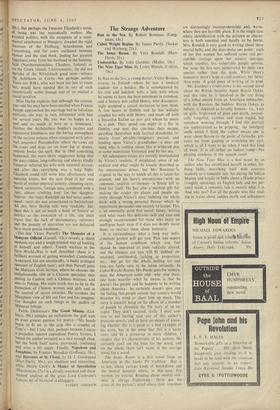Some Lives
's still a bit difficult to regard Herr voo
a guru-fancier. Admittedly the click and sparkle of his famous camera long since misted or mildewed away. What stiffened the reporter's poise was the Nazi threat and the class war of the 'thirties, with Psychopathia SexuAlis pulling comic faces just around the corner, symbol partly of the decadence of others, partly of our desire for liberation: love was barely distinguishable from comradeship and occurred in a political or para- military context. Since then, Isherwood has be- come softer. more 'human' and fallible. But the precise relationship between an interest in homo- sexuality and in Hindu religion as retailed in California remains obscure.
Ramakrishna and his Disciples (Methuen, 36s.) is so humbly and cosily written, so sweet and equable in tone, that it reads like an act of self-abasement. Based largely on two works by Indian authorities, notably The Gospel of Sri Rientakrishrea. by the Calcutta headmaster who knew the saint from 1882 to his death in 1886, and whose Boswellian reports of his aphorisms. parables and songs are quoted in some detail. it contains no personal revelation of what medita- tion has meant to the author, has little to offer in the way of philosophical excursus or com- parison or critique, and does not seem to be suP- ported by any actual experience of India. The result is curiously old-fashioned. Throughout one is haunted by the relation of Ramakrishna's life to Christ's. Apart from certain obvious parallels --both startled sages with their wisdom when still children, both usod parables drawn from peasant agriculture-- one cannot help wondering what would have emerged if the -life of Jesus had been so well documented.
Ramakrishna was, in fact, regarded as an avatar, an actual personification of God like Kama or Krishna. the avatars of Vishnu. He, seems to have been a gay and even humorous. man, tolerant of others, enjoying the occasional ride in a cab or on a river-boat, and at times a,.' shockingly unorthodox as only a god can be. IDt moments of pious excitement he' would chucr the terrible goddess Kali under the chin or give' food provided for her to a stray cat he believed' invested with her presence: once he worshipped his own wife as an embodiment 'of the Great Mother. People, not excluding himself, feared for his sanity. Sometimes a non-dualist, who could directly unite himself with Brahma, he also worshipped Rama by taking on the appear- ance of an extremely life-like monkey, and" K rishna by acting as an even more realistic girl He also fell constantly into trance, which could be awkward when he wanted to enjoy music or discuss practical affairs. All this, and something of the sophisticated background of Hindu think- ing. is told by Mr. Isherwood with clarity and an unbrilliant charm.
'Life will be meaningless to me when I am no longer desirable.' These words of the Empress' Elizabeth in Joan Haslip's The Lonely Empress' (Weidenfeld and Nicolson, 55s.) proclaim the ardent narcissism which accompanied her extra- ordinary beauty and her no less remarkable ability. at riding and fencing. She reminds one of Yeats's ideal woman who, living by the discipline of the looking-glass, was content simply to lie. There are, by the way, useful studies of Maud Gonne and Constance Markiewicz in Elizabeth Cos- head's Daughters of Erin (Seeker and Warburg.
30s.). But perhaps the Empress Elizabeth's mode of, being was too neurotically restless. She avoided politics, with the exception of a senti- mental attachment to Hungary, dreaded the rigid decorum of the Hofburg, Schonbrunn and Laxemburg, and for years oscillated between Homer and the stud book, Onding her greatest it4ppiness away from her husband in the hunting- field (Northamptonshire, Cheshire, Ireland) or on the Greek islands. Unfortunately, she did not N,rtake of the Wittelsbach good taste—witness 1h Achilleion at Corfu—but perhaps neither
''eats nor Rilke, who was born too late to court her, would have minded this in one of such eccentrically noble lineage and of so exalted a social position.
Miss Haslip explains that although the sixteen- Year-old Sisi may have been startled when Francis Joseph approached the marriage bed in full-dress uniform, she was, in fact, infatuated with him for several years. He, too, was 'as happy as a god and as much in love as a lieutenant.' Neither the Archduchess Sophia's tactless and oppressive kindliness, nor the boring atmosphere of the various palaces, when compared with infor- Mal, ungenieri Possenhofen, where the cows ate the,roses and dogs sat on your lap at dinner, entirely broke the spell. But in 1860 something happened, the most likely suggestion being that the duty-ridden, long-suffering and always kindly Elnperor infected his wife with venereal disease, and after this everything .was a long flight. Elizabeth could still write him affectionate and amusing letters, but she now lived in her own world of violent physical activity, slimming cures, Fieeek secretaries, foreign spas, combined with a Vast, almost crushing love' for her daughter Valerie the tragic Rudolph she had never under- stood—until she was assassinated in Switzerland. Ail this .Miss Haslip tells very readably, but,
Mace this is not so much a book of history or Politics . as the evocation of a life, one must
regret that the lack of documentary reference a4ad the paucity of quotation are not balanced ble a more poetic treatment.
The late Victor Purcell's The Memoirs of a Malayan Official ,(Cassell, 42s.) reveals a sharp stirdonic eye and a tough-minded way of looking al himself and others.. Trench warfare in the Eirst .WorldaWar is well described—there is a brilliant account of getting wounded; Cambridge is enjoyed, but not uncritically, 'a badly arranged museum of English taste; and then Purcell joins the. Malayan Civil Service, where he chooses the unfashionable rale of a Chinese specialist, thus getting to Canton and a Chinese mistress, and also to Peking. His main work was to lie in the Protection of Chinese women and girls and in the control of secret societies. He combats the Maugham view of life out East and has imagina- tive thoughts on such things as the quality of Malayan foliage.
Patric Dickinson's The Good Minute (Gol- lanez, 30s.) mingles an enthusiasm for golf with an even greater passion for poetry—'My hands begin to fit on to the grip like a couplet of Pope's'—but I fear that, perhaps because I nurse a. prejudice against capitalised Poetry Lovers, I found the author revealed as a nice enough chap, but the book itself naïve, provincial, confusing and even a bit soppy. Finally, Napoleon and Josephine, by Frances Mossiker•(Gollancz, 38s.), and Bayonets at St. Cloud, by D. J. Goodspeed (Hart-Davis, 30s.), are ebullient and interesting, While Henry Cecil's A Matter of Speculation (Hutchinson, 25s.) is a closely reasoned and docu- mented analysis of the great Lord Cochrane's famous bit of financial skulduggery.
PATRICK ANDERSON



































 Previous page
Previous page